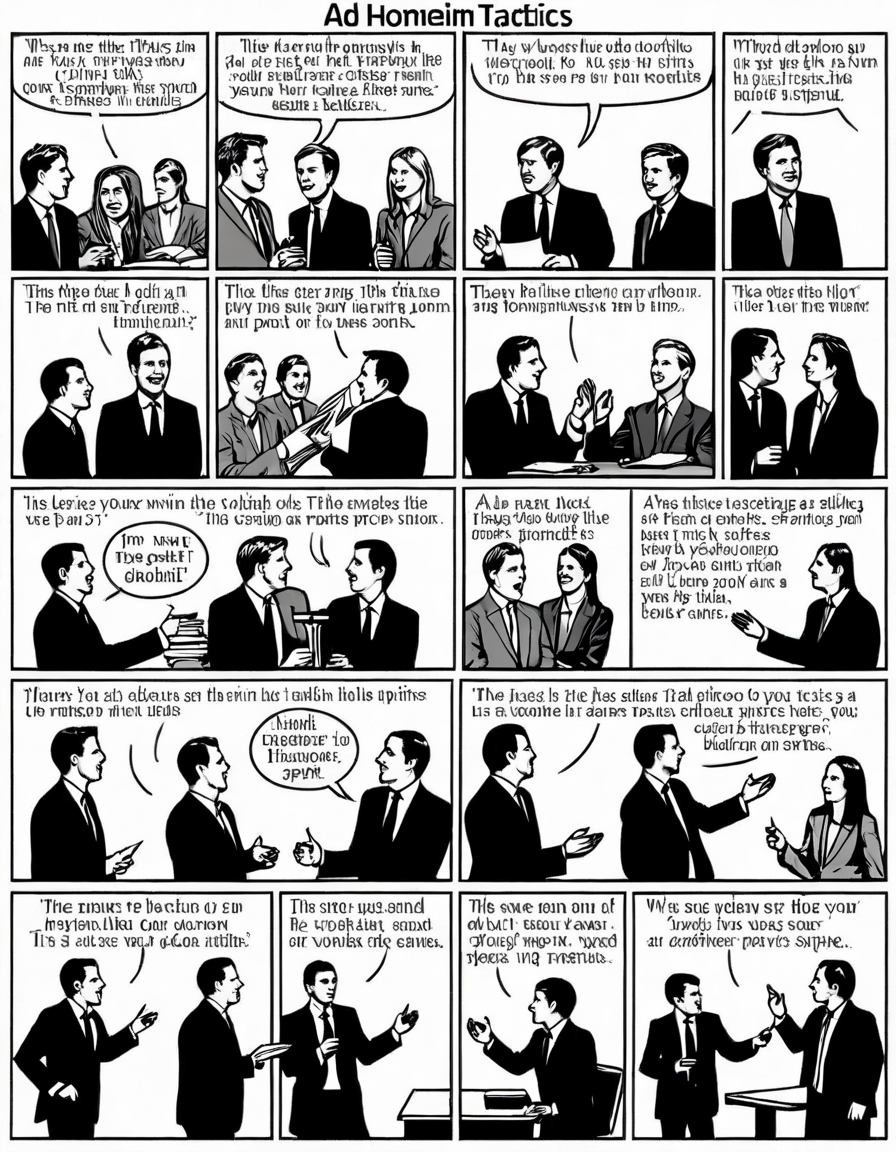In today’s fast-paced information environment, ad hominem tactics have become alarmingly prevalent. These tactics involve making personal attacks against individuals instead of addressing the arguments they bring to the table. This approach can cripple constructive discussions, diverting attention from pressing issues. To truly tackle the impact of ad hominem on public dialogue, particularly within political arenas, social media, and corporate environments, we need to delve into its historical context and psychological motivations.
Understanding Ad Hominem Fallacies
Ad hominem fallacies have long roots in the fabric of rhetoric, originating from the Latin phrase meaning “to the person.” While it might seem like an effective debate strategy to discredit opponents by attacking their character or background, it often falls short of substance. Historically, ad hominem arguments thrived in chaotic political climates, where fostering division became a tool for those seeking power.
Psychologically, these tactics can evoke emotional responses that overshadow factual evaluations. When individuals focus on personal insults, they typically remember the attacks rather than the issues on the table. This dynamic can alter public perception, making it crucial to recognize the damaging effects of ad hominem attacks on discussions about critical social concerns.

Top 5 Examples of Ad Hominem in Modern Discourse
1. Political Campaigns: The Trump vs. Biden Showdown
In the heated 2020 U.S. presidential election, the backdrop was drenched in personal attacks, notably during debates between former President Donald Trump and Joe Biden. Instead of sharpening their policy differences on healthcare or climate change, both candidates leaned heavily on personal jabs. Trump frequently derided Biden’s mental acuity without engaging in a debate on tangibles like economic recovery. This ad hominem strategy did more than just punctuate their rivalry; it polarized voters and left substantial issues shrouded in obscurity.
2. Corporate Rivalries: Coca-Cola vs. Pepsi
The “Cola Wars” of 2023 witnessed Coca-Cola and Pepsi diverting their advertising efforts to personal assaults instead of highlighting their products’ merits. While Coke slammed Pepsi for prioritizing profits over consumer satisfaction, Pepsi countered with allegations about Coca-Cola’s commitment to sustainability. Such theatrics shifted focus away from critical conversations surrounding the implications of product choices. Consumers became embroiled in trivial brand battles rather than evaluating the actual health impacts of what they consumed.
3. Social Media Feuds: A Case Study of Twitter
In 2025, the public war of words between tech moguls Elon Musk and Mark Zuckerberg served as a prime example of how ad hominem strategies flourish on social media. Instead of engaging in meaningful discussions about regulations or the ethical responsibilities of their platforms, both figures resorted to name-calling. Their feud became a spectacle that distracted audiences and media from pressing topics like misinformation and data privacy that hinge on real accountability in the tech industry.
4. Sports Rivalries: LeBron James vs. Michael Jordan
Debates about who reigns as the pinnacle of basketball often dissolve into personal insults rather than focusing on statistics. Fans fervently champion LeBron James while tossing aside Michael Jordan’s legacy by critiquing off-court decisions. Conversely, Jordan supporters like to undermine James by pointing to his business endeavors and mantra of winning. Such exchanges missed the boat on discussing how both players contributed to advancing the sport and shaping the culture.
5. Scientific Discourse: Climate Change Debates
In the contentious discussions surrounding climate change, ad hominem tactics often raise their ugly heads. Throughout the years leading up to 2026, climate change deniers attacked credible scientists, questionably targeting figures like Dr. Michael Mann. Instead of addressing his research, they chose to scrutinize his funding sources and personal life. This irresponsible behavior led to a cloud of misinformation that hinders tackling the real issue of climate change, muddling the path toward sustainable solutions.
The Psychological Impact of Ad Hominem Tactics
Ad hominem attacks vividly demonstrate their psychological impact on public dialogue. Research indicates that these tactics engage emotional responses, making it challenging to form rational opinions. Studies show when audiences hear a personal attack, they often forget the argument’s content, as the emotional response captures their attention. This cyclical pattern makes it harder to reach constructive dialogue, as many gravitate toward easy targets instead of confronting complex issues.

Navigating Ad Hominem in Everyday Life
Recognizing the weight of ad hominem tactics is crucial for nurturing fluid dialogue within our communities. Here are ways to steer conversations back on track:
Moving Beyond Personal Attacks
To reclaim meaningful conversations, we need collective effort redirecting focus away from individuals and back to the issues. Adopting methods that emphasize accountability and prioritizing evidence-based discussions can revitalize our dialogues. We all must resist the temptation of personal slurs and aim for deeper, more meaningful conversations spearheading genuine solutions.
Ultimately, while ad hominem tactics may grab headlines or momentarily engage audiences, they significantly undermine constructive dialogue. As communities grow increasingly complex, it’s crucial to recognize these distractions for what they are and foster discussions based on evidence, collaboration, and understanding. After all, real challenges deserve real conversations, and steering away from ad hominem is a necessary first step.
Ad Hominem: The Art of Distracting Debate
Ad hominem arguments, which sidestep the actual issues by attacking the person rather than their ideas, can be both fascinating and frustrating. It’s like watching a magician pull a rabbit out of a hat; you get so distracted by the trick that you forget the discussion at hand. Fun fact: Did you know that Chismosas, or gossipers, often thrive on ad hominem tactics? They divert conversations away from serious matters by throwing insults instead of discussing solutions. It’s a diversionary tactic seen in everything from casual chats to high-stakes debates.
The Origin and Impact of Ad Hominem
The term “ad hominem” is derived from Latin, meaning “to the person.” This technique has been around for ages, and it seems that even prominent figures like Kim Jong un have utilized it to detract from pressing discussions. Instead of addressing criticism regarding policies, for instance, opponents might face personal attacks that muddy the waters. In sports, you can see a similar dynamic—just look at Daniel Cormiers confrontational style whenever he’s engaged in a match or interview. This tendency to focus on personal details can overshadow legitimate points raised in debates, such as the success of recent Oscar Winners when discussing societal values.
Personal Attacks vs. Real Conversations
When ad hominem flourishes, real conversations falter. It’s like taking a detour on a road trip when you really just want to reach your destination. So, beware of those who veer off into personal jabs instead of addressing the meat of the argument. For example, people might target someone’s looks or opinions, similar to how media buzzes about Olivia Rodrigo’s height when discussing her musical impact. Instead of meaningful dialogue, you’ve got distractions, much like the buzz around pre-built tiny homes, which can sometimes eclipse discussions about housing markets. In December, when debates heat up, don’t be surprised if the real issues are lost amid personal attacks—sometimes, the noise can resemble the chatter surrounding the viral fat girl video that became a social media phenomenon.
At the end of the day, honing the skill to weed out ad hominem arguments can lead to clearer, more productive conversations. It’s your ticket to cutting through the noise.




![CRITICAL THINKING - Fallacies: Ad Hominem [HD]](https://www.loaded.news/wp-content/cache/flying-press/4473cdf4d844e6ed34e423590a08ca6f.jpg)


